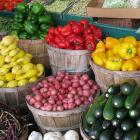Did you know that the food that you eat travels an average of more than 1,500 miles to reach your plate?1 When you buy local food or products that were manufactured in your country or even more locally, you are helping your nation's economy. You also are supporting farmers directly. Most importantly, you are also reducing how much pollution you are causing indirectly through consumption. Local consumption can really help reduce your greenhouse gas emissions and your impact.
Buying items from farmer's markets as opposed to buying from supermarkets is incredibly less energy intensive. Brian Halweil of the Worldwatch Institute found that a typical meal bought from a conventional supermarket chain uses 4 to 17 times more petroleum for transport than the same meal using local ingredients.1
Why buy local?
It's good to buy local grown food for many different reasons. Reducing your food miles, fresher taste and better nutrition when eating in season. By eating what’s in season locally we put less stress on the Earth. Like by growing food at an unnatural time or shipping foods from far away. Shopping at farmers’ markets and specialty local food shops all have fresh locally grown foods.
Buying local food at a farmers’ market or farm stand cuts that travel significantly. It also gives you an opportunity to get to know your local farmers as well as learn how your food was grown. At your regular grocery stores and supermarkets, read the labels when you shop. Or talk to the produce manager to help make choosing food that is locally produced easy throughout the year. Buying local from farmers' markets or from anywhere else just makes sense for you and your family.
1Worldwatch Institute. Home Grown: The Case For Local Food In A Global Market

